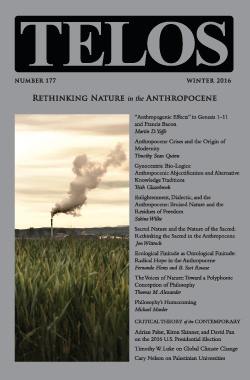Fernando Flores and B. Scot Rousse’s “Ecological Finitude as Ontological Finitude: Radical Hope in the Anthropocene” appears in Telos 177 (Winter 2016), a special issue on “Rethinking Nature in the Anthropocene.” Read the full article at the Telos Online website, or purchase a print copy of the issue in our online store.
 The vulnerability we confront in the Anthropocene is what Jonathan Lear has called ontological vulnerability: the possible collapse of our world, that is, the collapse of the taken-for-granted way of life that guides and orients us in our everyday practices. In this paper, we take up Lear’s claim that in the face of the impending collapse of one’s world, a peculiar form of hope, radical hope, is called for. According Lear, radical hope means holding on to a “commitment only to the bare possibility that, from this disaster something good will emerge.” On the way to specifying a more robust form radical hope in the Anthropocene, we examine and criticize Hubert Dreyfus’s response to Lear. For Dreyfus, pre-technological marginal practices left over from past historical worlds can provide the foundation for a reconfiguration of our current world, a way of emerging revitalized from world collapse. But Dreyfus’s backwards-looking orientation is problematically one-sided: it overlooks that our world is also a forward-directed historical drift, with new possibilities and practices emerging in the present. By becoming receptive to the onward drift of historical emergence we can cultivate a sensibility to the way historical moments ripen and gather around us. Thus, the radical hope for a future shift in our practices in the wake of the Anthropocene does not have to be a hope for a “bare” possibility of change; it can be a hope fueled and guided by an active receptivity to the ways in which things and possibilities historically emerge.
The vulnerability we confront in the Anthropocene is what Jonathan Lear has called ontological vulnerability: the possible collapse of our world, that is, the collapse of the taken-for-granted way of life that guides and orients us in our everyday practices. In this paper, we take up Lear’s claim that in the face of the impending collapse of one’s world, a peculiar form of hope, radical hope, is called for. According Lear, radical hope means holding on to a “commitment only to the bare possibility that, from this disaster something good will emerge.” On the way to specifying a more robust form radical hope in the Anthropocene, we examine and criticize Hubert Dreyfus’s response to Lear. For Dreyfus, pre-technological marginal practices left over from past historical worlds can provide the foundation for a reconfiguration of our current world, a way of emerging revitalized from world collapse. But Dreyfus’s backwards-looking orientation is problematically one-sided: it overlooks that our world is also a forward-directed historical drift, with new possibilities and practices emerging in the present. By becoming receptive to the onward drift of historical emergence we can cultivate a sensibility to the way historical moments ripen and gather around us. Thus, the radical hope for a future shift in our practices in the wake of the Anthropocene does not have to be a hope for a “bare” possibility of change; it can be a hope fueled and guided by an active receptivity to the ways in which things and possibilities historically emerge.









Before we can ‘rethink’ nature we need to first rethink human nature! There one might find the “hope for a “bare” possibility of change; it can be a hope fueled and guided by an active receptivity to the ways in which things and possibilities historically emerge.”